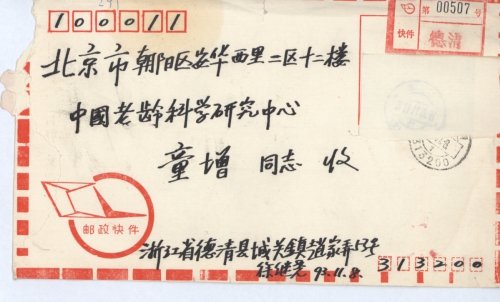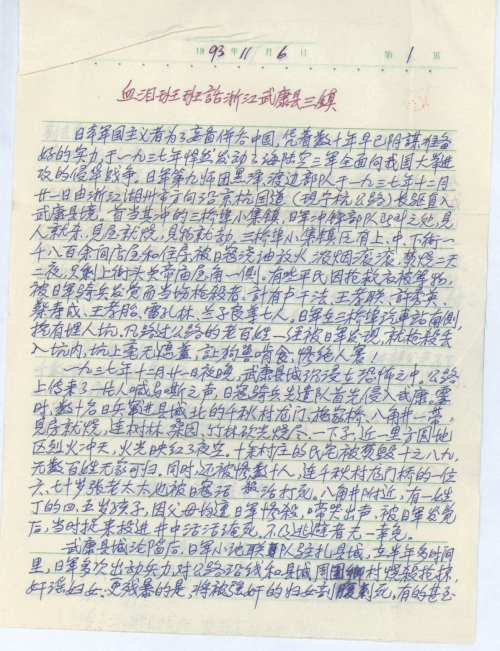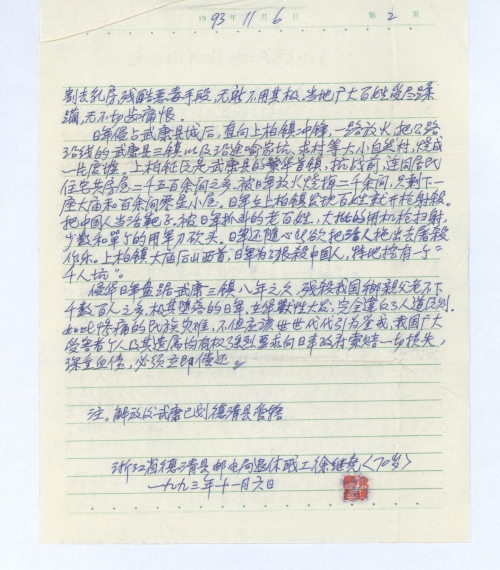Date of letter:1993-11-06
Address of author:Deqing County, Huzhou City, Zhejiang Province
Date of event:1937-12-21
Location of event:Wukang County, Ningbo City, Zhejiang Province
Name of author:Xu Jiyao
Name(s) of victim(s):Common people in Wukang County
Type of atrocity:Other Massacres, Murders, Rapes, Others(OM, MU, RA, OT)
Other details:One night in 1937, the Japanese invaded the Wukang County, burning houses as they wished and made countless people homeless. Dozens of people were cruelly killed. After the fall of Wukang County, the Japanese committed atrocious crime to surrounding villages by burning, looting, killing and raping women to death. For the massacre did to my fellows I strongly urge the Japanese government to compensate all the losses.
Tragic History of Three Towns in Wukang County, Zhejiang
To annex China, Japanese militarists launched a comprehensive war of aggression against China in 1937 after preparing for dozens of years. On December 21, 1937, KUROSAWA and WATANABE Brigades of the No. 9 Division of the Japanese army marched directly from Huzhou City, Zhejiang Province to Wukang County along the Nanjing-Hangzhou National Highway (now Ninghang Freeway). Sanqiaobu market town was the first to suffer. The Japanese army killed, burned and looted anywhere they went. Over 1,800 shops and residential houses in the Upper, Middle and Lower Streets of Sanqiaobu were set to fire by the Japanese army. The fire lasted for two days and nights. At last, only a corner of the Temple of Lord Guan in the Upper Street remained. Several villagers saving clothes and quilts from the fire were seen by the Japanese soldiers and shot dead on the spot, including Lu Ganfa, Wang Xiaolian, Xu Xiuying, Cai Shoucheng, Wang Xiaotai, Lei Konglin and Lan Ziliang. The Japanese army dug a pit to the south of the Sanqiaobu Bus Station. Every time they saw Chinese people passing by, they would shoot them dead and throw them into the pit. As the pit was not covered, the victims’ corpses would be freely eaten by dogs and other animals. How tragic is that!
On the night of December 21, 1937, Wukang County was cloaked in terror. With the sound of people and horses coming from the freeway, the Japanese cavalry advance troop first reached and invaded Wukang. Instantly, dozens of Japanese soldiers ran to Longmen, Shijiaqiao and Bajiaojing in Qianqiu Village in the north of the county, where they burned houses, woods, mulberry gardens and bamboo groves. Quickly, the sky within a diameter of 500 meters was lit up by a huge fire. Eighty or ninety percent of the houses in over 10 villages were burned down, which made numerous people homeless. Moreover, dozens of people were cruelly killed. A 60- or 70-year-old Mrs. Zhang from Longmenqiao, Qianye Village was beaten to death by the Japanese army. Near Bajiaojing, a 4-or-5-year-old child was discovered by a Japanese soldier after it cried out because both of its parents were killed. The soldier captured the child and threw it into a well. Thus, the child was drowned alive. Moreover, none of those people who failed to escape survived.
After Wukang fell, the KOIKE Regiment was stationed in the county. In more than half a year, the Japanese army sent troops for multiple times to kill, burn, loot and rape in villages along the freeway and surrounding the county. More cruelly, the Japanese soldiers would cut open the belly or even cut off the breasts of the women after raping them. As all the local people have suffered greatly from the cruelty of the Japanese army, they all hate them to their guts.
After occupying Wukang, the Japanese army marched to Shangbo Town and set fire along the way. Three towns in Wukuang county and all big or small villages along the freeway such as Yujiakeng and Qiu were all burned to ruins. Shangbo Town was originally the most bustling town in Wukang County and had over 2,500 houses including residential houses before the War of Resistance. After the Japanese army invaded Wukang County, over 2,000 houses were burned down and only a big temple and over 100 scattered small houses were left. Moreover, the Japanese army shot any Chinese people they saw in Shangbo Town by treating them as live targets. Most of the people captured by the Japanese army were shot dead by machine guns and a few of them were beheaded. The Japanese army would freely drag out live people and kill them for fun. To conveniently bury Chinese people, the Japanese army dug a “Thousand People Pit” in the west of the mountain behind the temple in Shangbo Town.
During the eight years when the extremely depraved, beast-like invading Japanese army occupied the three towns in Wukang, they killed no less than 1,000 Chinese people, totally violating the humanitarian principles. Such a tragic national disaster shall be remembered by every generation. All Chinese victims and their family members have the right to strongly demand compensation from the Japanese government. The compensation must be paid immediately.
Note: After the People’s Liberation, Wukang is under the jurisdiction of Deqing County.
Retired employee from the Post Office of Deqing, Zhejiang
Xu Jiyao (70 years old) (Personal seal)
November 6, 1993
















